This is my first feature for the Times. I'll be writing fortnightly on Buenos Aires and Argentine culture. From an honest restaurant review, to interviews with interesting locals, to features on architecture and interior design, to any story I feel compelled to tell.
As an English woman living in Buenos Aires for 14 years, raised trilingual in France and the United Kingdom by my Argentine mum and British Dad, I’ll be sharing my unique gaze and vision of my adoptive city, one that I’m proud to call home and that continues to be an insatiable source of inspiration.
I also create curated tours and experiences of Buenos Aires, showing the B-side and hidden treasures of the capital, from architecture and interior design to art, architecture, old school stores, the best of BA’s emerging and independent fashion scene, to artisanal craftsmanship, collectibles, vintage, books and vinyl.
I never stop researching, and look forward to sharing my discoveries and observations in my column. Thanks for reading!
Evelia (Campos Salles 1712) is possibly Buenos Aires’ most hotly anticipated restaurant opening of 2024. Máximo Togni, already well respected on the local food scene thanks to a string of successful enterprises – from dogg hotdogs, to Togni’s Pizza and Togni’s Cafe – has consistently raised the bar with each endeavour to create the best possible version of everything, from the best hot dog in town to the ultimate madelaine. Nothing is left to chance nor are corners cut.
The restaurant Togni has always dreamed of opening is located in Nuñez, and is named after his beloved Italian grandmother. It had been in the pipeline for years. She greatly influenced him with her approach to life and love for cooking and the rituals involved with dining – it was Evelia who taught Máximo to cook during his formative years.
Interior designer Coty Larguia, who led the project, worked closely with Togni to create a space that would be a fitting tribute to Evelia’s legacy, not only in terms of the food served but also by reflecting her essence in the decor. She drew from family photos and Máxi’s vivid childhood memories of his grandmother’s house in Maipu, as seen in the upholstery of the benches which reproduces the colours and pattern of one of abuela’s dresses from the 1970s.
Evelia was inaugurated on May 16. Two weeks prior, they began accepting bookings and within half an hour had already received over 2,700 requests. A promising start before the restaurant had even opened and in light of Argentina's recession.
We ate there on day 11, something I’m normally reluctant to do due to the inevitable teething problems that arise in the early days of any new culinary venture. We were seated at the bar, looking onto the bustling open-plan kitchen where Máxi, a quiet and sensitive man of few words, quietly lead the cacophonous operation from the sidelines, hovering over each and every dish to spot the slightest imperfection before giving a silent nod of approval for them to be whisked away by the wait staff.
The current menu is accessible, simple and no nonsense with a clear focus on hearty comfort food made with the best ingredients money can buy. By his own admission Máxi is waiting to consolidate his team over the coming months in order to be able to introduce more complex dishes, but he feels it’s still very early days. “It's a way to enjoy dishes that perhaps people don’t make at home anymore and don’t have the time to – they’re also my everyday personal favourites,” he explained.
The night we visited the restaurant’s staff, though clearly enthusiastic, seemed overwhelmed as they found their feet with a noisy restaurant at full capacity. Service was slow, and they mixed up my cocktail order, but the happy accident meant that I serendipitously got to try the zingy pineapple Jungle Coq (which I had debated ordering). None of the above was anything I couldn’t overlook given the quality of the dishes we went on to savour.
The breadbasket, with warm sourdough rolls and homemade grisines created by Atelier Fuerza is memorable and heralds the quality of what’s to come. We try fluffy and crispy gnocco, a fried ravioli of sorts, which we were encouraged to eat like a sandwich and was stuffed with stracciatella and lashings of wafer thin slices of Parma ham, bondiola and finocchiona, a traditional cured ham with fennel seeds which hails from the Tuscany region.
This was followed by two pasta dishes, the menu’s forte. The mushroom cappelletti, a delicate reduction of cream and organic lemons, is cured in salt for approximately two months and finished off with an egg yolk and parmesan emulsion. While the idea is to source and use the best local produce as much as possible, Máxi explains that for the pasta dishes he’s forced to use Italian cheeses as the higher fat content in Argentine hard cheese means they don’t emulsify properly.
Our second pasta plate, a melt in the mouth pork-and-beef agnolotti, is balanced perfectly with a parmesan foam, croutons and lemon zest married sublimely with the buttery jus from the slow-cooked meat.
We finished by sampling three ice creams, all made in-house. The yoghurt ice cream with cherries is subtle and refined. I love the salty notes of the pistachio with drizzled caramel, while the Sambayon is bold and boozy, made with Marsala brought back by Maxi from his travels.
Máxi insists that the meal is on the house, so I request a second booking. There’s no such thing as a free lunch and I firmly believe in the importance of paying your way to be able to write freely and objectively.
A fortnight later we’re back as paying customers, and the improvement is palpable, the wait staff seemed more at ease and attentive, with seasoned maître Gisele Amparan ensuring everything runs seamlessly. We tried the gnocchi with basil, Gran Padano and pine nut pesto – a rare luxury in Argentina where the traditional recipe has been adapted to use walnuts instead due to their scarcity locally, again sourced by Máxi personally on his trips to Europe. It was tasty but didn't blow me away, unlike the four-cheese tortelloni and slow-cooked meat sauce which immediately transported me to Sunday lunch en familia at my in-laws. To be able to recreate that homecooked essence in a restaurant dish is an art. We didn't order the milanesa, but our waitress tells us that the feedback from many has been that it is identical to the ones their nonnas used to make.
If that's not an endorsement that Máxi has nailed it then I’m not sure what is – it’s also an incentive for a third visit for a taste of delectable Argentine nostalgia.







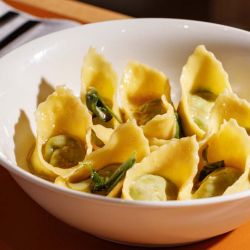

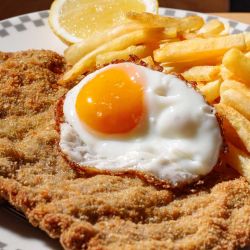
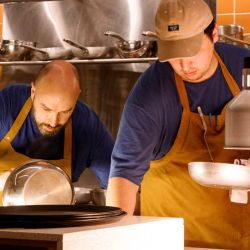
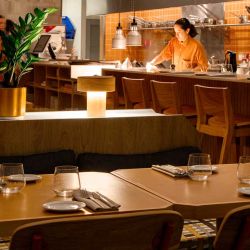
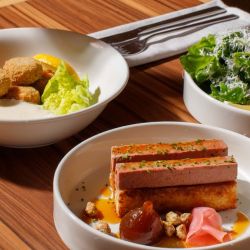















Comments